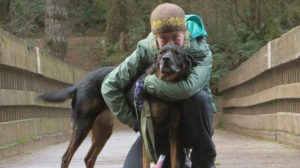
Emily Amsler and her dog Charlotte
By Ala Errebhi, Reporter
From KTTC.com
ST. PAUL, Minn. (KTTC) –
Dogs and humans share a special bond, like the bond between Emily Amsler and her dog Charlotte.
“I’ve read and heard about people who have their canine soulmates, which is a fairly accurate term I think.”
Sadly they also share a deadly type of brain cancer: glioblastoma. It’s a tumor and if it’s found in a dog, the dog usually has one to two months to live.
Some of the symptoms include loss of sight or seizures.
Emily is a vet herself, and was able to detect the symptoms right away in Charlotte.
“She went blind on the right side and an exam found the lesion to be localized to the brain. We did an MRI and there’s a tumor in her left forebrain. I assumed I would have like a few weeks to months left with her,” she said.
Pet dogs diagnosed with this tumors have few treatment options and are often euthanized shortly after diagnosis.
But that’s where Dr. Liz Pluhar, a professor of veterinary clinical sciences, and her colleagues at the University of Minnesota come in.
Dr. Pluhar and her colleagues say this research project and trials may improve survival rates in dogs, and give other researchers more insight into glioblastoma to apply to human trials.
When people are diagnosed with glioblastoma, they have a median survival of 14 months, despite surgery, radiation and chemotherapy.
“It turns out that dogs spontaneously develop these high-grade gliomas, these brain tumors that are very similar to the ones that people develop,” said Dr. Pluhar. “And so we started using these pet dogs that develop these brain tumors naturally to test new therapies before trying them in people hoping that how the dogs respond would better represent how people would respond to the therapy.”
Dr. Pluhar and her team have been working on this research for 10 years. Dr. Pluhar’s project hopes to improve outcomes in dogs by combining surgery with immunotherapy and a vaccine.
After a glioblastoma diagnosis a dog usually has one to two months to live. But with surgery like the one Dr. Pluhar performs and immunotherapy, Charlotte’s life could be extended by 14 months.
So Emily road tripped from Washington state to Minnesota.
“There’s very few neurologists or surgeons who would do this type of surgery,” said Emily. “it doesn’t extend the survival time of the dog.”
Previous studies were successful at prolonging survival for most dogs, but the tumor recurred over time.
“We were able to keep the tumors from coming back for about 7 or 8 months. But they always grew back, the high-grade gliomas always grew back,” said Dr. Pluhar.
But Dr. Michael Olin, an associate professor teaching immunology against cancer, discovered that the tumors secreted a substance that blocked the body’s natural immune response.
“We were trying to stimulate an immune response that doesn’t naturally happen against brain tumors because of the brain kind of being a protected area of the body from an immune response,” said Dr. Pluhar.
“We know that these kinds of brain tumors are actually really good at hiding from the immune system,” Dr. Matthew Hunt, an associate professor of neurology at the Minnesota School of Medicine.
“We developed an allogeneic, a cell line to teach the immune system to attack tumors, specifically brain tumors,” said Dr. Olin. “We’re actually targeting a specific receptor on the antigen presenting cells that actually elicited an immune response. It cranks up the immune system, it doesn’t just block a suppressor property, it actually elicits and activates the immune system.”
Dr. Olin then did something amazing. He manufactured a peptide called CD200, which overrides the tumor’s attempts to protect itself from the body’s immune response.
The good news is his peptide, CD200, stopped the tumors from recurring, and has prolonged dogs’ lives.
The even better news: Charlotte didn’t have a tumor. She had a stroke, and was treated for dead brain tissue. Once that was done, Charlotte’s MRI’s were normal.
Dr. Pluhar said the hope is the human CD200 clinical trial would start this fall, pending FDA approval to use the peptide.








